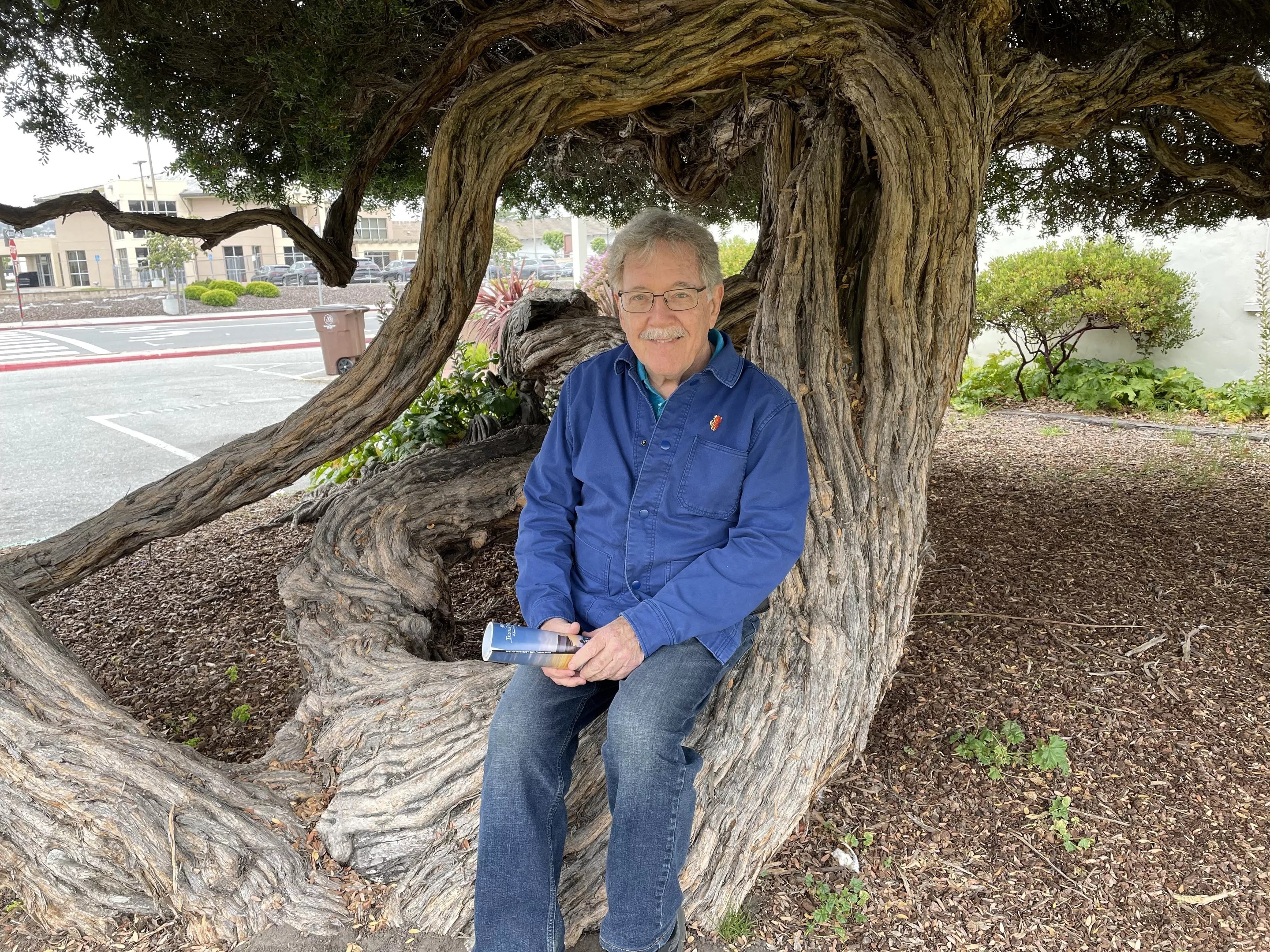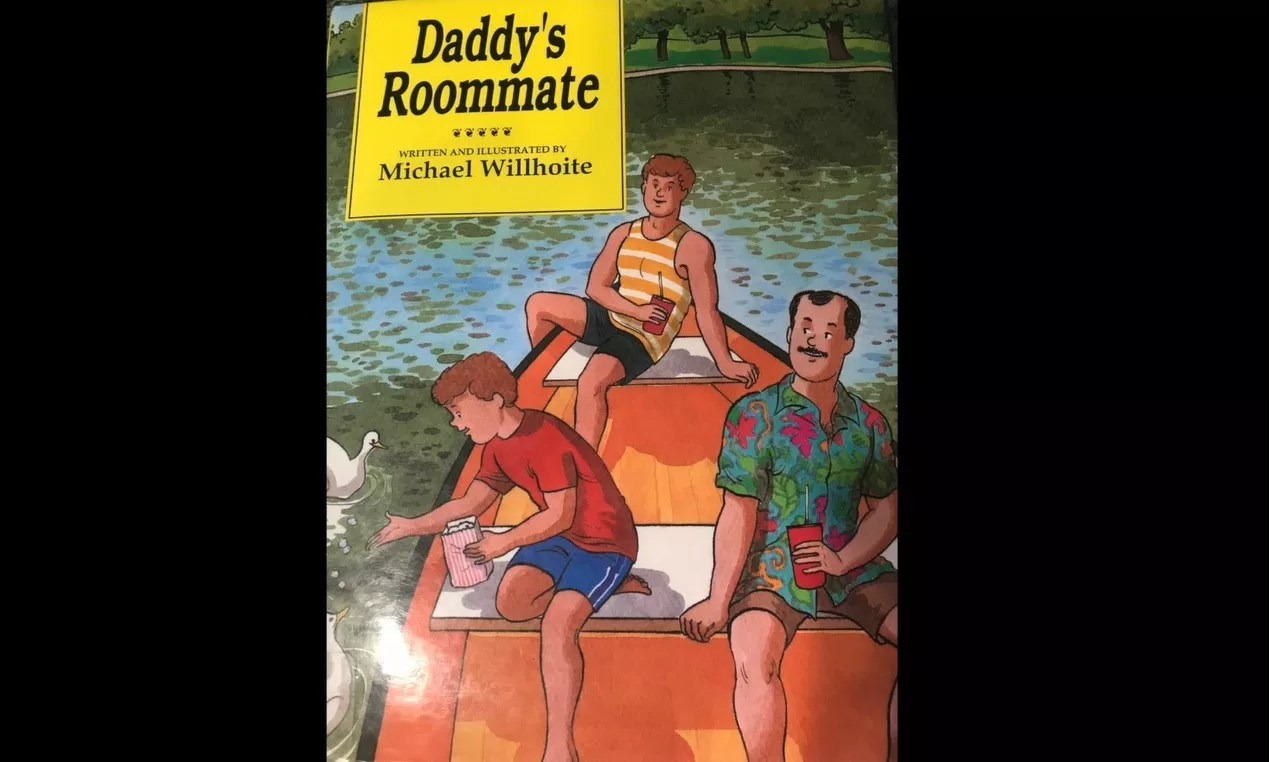
Photo by Michael Willhoite

Audio By Carbonatix
When author and illustrator Michael Willhoite’s book Daddy’s Roommate hit the shelves in 1990, the blowback was unrelenting.
The book, which tells the tale of a gay couple raising a son in a loving household, became the target of infuriated activists, including one Oregon man who characterized it as evidence of a “militant homosexual agenda.” On a 1992 Larry King Live segment, a concerned guest denounced the book for its “explicit pictures of two men hugging each other.” It eventually became one of the most challenged books in the nation in the mid-1990s – an era when MC Hammer was blasting on the radio, Bill Clinton was president, and Ronald Dion DeSantis was a baseball-loving teenager in central Florida.
As one of the first widely distributed children’s books to show gay people parenting, Daddy’s Roommate was bound to make waves. But given that none of the pages contained graphic or risque content, Willhoite was surprised by the sheer scope of the backlash. A moment in the book where one of the gay characters is in bed, falling asleep next to his partner, fueled the fury.
“People who read it let their imaginations fly away. They see the picture of the two men, and they imagine the next page is going to show one humping the other,” Willhoite jokes.
Willhoite, 77, tells New Times the controversy, however unsettling, was “a shot in the arm for sales.” He wrote a follow-up with the same characters called Daddy’s Wedding, which prompted another kerfuffle but did not draw the same level of ire as Daddy’s Roommate. The outrage gradually petered out, and Daddy’s Roommate went out of print. In the years that followed, Willhoite didn’t anticipate much more controversy over the works: on the surface, he saw the nation’s collective homophobia seemingly subside as polls showed greater acceptance of gay marriage and parenting.
Now, more than 30 years after its publication, Daddy’s Roommate has once again found itself the target of censorship. Last week, the Miami-Dade County school district confirmed to New Times that it had pulled the children’s picture book from school libraries, including it in a list of removed works that the district deemed “inappropriate” for students.
The book’s removal comes amid a resurgence in book bans nationwide, with Texas and Florida leading the pack, according to PEN America. Apart from the question of when to introduce students to mature literary themes and content, some parents and activists have attempted to erase outright the existence of gay characters from school books and classroom materials. A teacher in Hernando County, for example, was recently chided by a school board member for allowing students to see a gay character in the Disney movie Strange World.

Daddy’s Roommate depicts a gay parent and his partner taking his child to a baseball game, the zoo, and the park.
Screenshot of readthrough by Lee Villani/Vimeo
Those who are trying to remove any reference to LGBTQ people from schools often rely on stoking concerns in parents that there is an effort to groom and indoctrinate their children.
“They like to think that if they pretend that gay people don’t exist, we don’t exist,” Willhoite says. “People are easily capable of being inflamed. I’ve been becoming quite cynical, realizing how few people think carefully about things and just accept supposed truths.”
Before establishing his career as an illustrator, Willhoite served in the Navy for five years. He says he lined up a job doing medical drawings of surgeries and medical implements for the military – a role that kept him out of the Vietnam War. The Oklahoma native then served as a civilian illustrator for the Army for 20 years beginning in 1981. In addition to his work in the publishing industry, he says he’s produced murals for the Pentagon and Fort Knox and worked as a set painter for a theater company in Wales.
When he recalls writing Daddy’s Roommate, he goes into self-critique mode, lamenting that it focuses on a “situation” rather than the kind of storyline in his follow-up book, which he had a bit more time to write and illustrate. He says he’s still proud of the ground the first book broke in the early 1990s.
“I’m fond of the book. It’s made my reputation,” he says.
Published by LGBTQ-focused Alyson Books (formerly known as Alyson Publications), Daddy’s Roommate follows the story of a boy whose divorced father moves in with his mustachioed new partner, Frank, illustrating the trio’s life through a series of watercolor images of them reading, cooking, going to the zoo, singing, and doing chores together. The book features one simple sentence per page, none containing sexual references or explicit material.
“Mommy says Daddy and Frank are gay. At first, I didn’t know what that meant. So she explained it,” the book reads. “Being gay is just one more kind of love. And love is the best kind of happiness.”
Miami-Dade Public Schools explained to New Times that Daddy’s Roommate was one of three books recently pulled from libraries, not in response to a challenge by parents, but because of an audit that deemed the works inappropriate for students. The school board cited the works’ “adult content” and “sexually charged language.” The other two removed works were bestselling fantasy author Sarah J. Maas’ A Court of Mist and Fury and Lauren Groff’s Fates and Furies.
Willhoite says he finds the book challenges and removals in states like Florida and Texas “especially alarming.” He decried efforts to axe classic novels from the classroom, including To Kill a Mockingbird – Harper Lee’s story that tackles racial tensions in an Alabama town, which some left-wing challengers have sought to remove from schools over epithets spouted by characters and depictions of racially driven violence.
“I see this happening for a long time. But I also see people fighting it. It seems enough people are getting upset about the book bans that something may be done about it. It’s hard to predict,” the author says.
Silencing those who tried to silence him, however, will likely prove fruitless and could backfire, Willhoite says. He says that censorship, even when dealing with radical voices, is not the answer.
“I don’t think anybody can prevent them from spewing their poison. As Voltaire said, ‘I disagree with what you say, but I will defend to the death your right to say it.’ Light purifies. Bring everything into the light and discuss.”
In Florida, the surge in the removal of books – many of which are centered on race, sexuality, sexual orientation, and gender identity – came amid a flurry of new public school regulations like the Stop WOKE Act, which sought to restrict classroom instruction about systemic racism, and Florida’s so-called “Don’t Say Gay” measures, a set of statutes and administrative rules that prohibit teaching about gender identity and sexual orientation.
Promoted and pushed by Gov. Ron DeSantis, those regulations don’t ban specific book titles, but book challenges mirroring the regulations’ language have flooded Florida school districts. Educators across the state have cited the laws and related administrative rules as the reason for the removal of books tackling LGBTQ- and race-related topics.
HB 1467, a bill that facilitated parents’ book challenges, mandated new school-librarian training, and reinforced school libraries’ “alignment to state academic standards,” was also passed in 2022.
Willhoite believes the anti-LGBTQ sentiment has likely been bubbling beneath the surface for some time. He considers himself far from a “firebrand,” but he fears the intolerance has snowballed beyond the pale.
“The only explanation I have for the move towards extremism is that there is a strong undercurrent of fascism in many countries, especially in America. But it hadn’t come out because no one lit the fuse. Donald Trump lit the fuse and blew up the rock under which these people were crawling. Now that the rock is up, we see what’s underneath, and it’s pretty bad,” the Rhode Island-based author says.
His advice? “Get mad and stay mad.”
“These people are powerful, but they’re being fought,” he says. “Say something. Do something. Demonstrate if necessary. You can’t just sit around and let these things happen.”